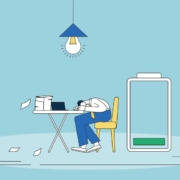Preventing Burnout in 5 Easy Steps
If you’ve been working in the past few years, you’ve probably heard about the term “burnout” and you should know that it is directly related to stress revolving around work. The general definition for burnout describes it as a combination of 3 factors: mental, emotional and physical fatigue combined with serious doubtfulness regarding your competence and value of work. Everyone has a couple of coworkers who stay for way too long at the office after the business hours have ended. Of course, this is understandable if they have an important contract to honour, a project deadline that cannot be pushed any further, or maybe they are just really dedicated. No harm, no foul until the stress from the actions mentioned above can transform itself into a serious case of burnout.
Entrepreneurs are flying into the face of danger due to their working program, which usually is 24/7/365. Given the fact that they are trying to build a serious company from the ground up and have to deal with issues left and right, the stress that is building up inside them can lead to a serious burnout.
Thankfully, nowadays there are many ways in which you can identify if you’re starting to experience burnout symptoms. They are pretty easy on the eye if you feel you are heading towards complete exhaustion. Here is a list of a few early signs of a potential burnout:
- Huge amount of stress and anxiety
- Low engagement or lack of it
- You’re more cynical than usual
- Not enough sleep
- No breaks during the day
- The feeling that there aren’t enough hours in a workday
- Consistent physical illness
These are 5 easy steps you should follow in order to get back on track on your own terms:
- Take frequent breaks during office hours
People sometimes fail to understand that it is an art to accomplish top workplace performance. You cannot remain at 100% during all of your working hours, which is why it is important to give your brain a bit of a break; it needs a recharge, just like your smartphone does. If you have a more flexible work arrangement, go for a run or a walk in nearby park. Try and have lunch outside the office space, it will allow you to decompress and maybe see the bigger picture. Needless to say, you need to careful when taking a break as well. Avoid doing so when your brain activity is at its highest, more often than not, this happens in the morning.
- Distance yourself from digital devices
Before the era of smartphones, gadgets and various wearables, when you left the office that meant you were done for the day. Even if you wanted to work from home, that required a lot of planning and effort. Now, we never really leave the workplace, because we are physiologically and psychologically very much still connected. Although it may seem difficult to get rid of this problem, there actually is an easy solution for it. As soon as you arrive home, either leave your phone somewhere in the hallway or even turn it off after a certain hour. You must understand that whatever you want to do CAN wait until tomorrow.
- Plan something interesting right after work
Whether this activity involves playing football with your friends or cooking with your loved one, it will make you focus on that particular action rather than telling yourself you shouldn’t check your emails every 10 minutes. You may as well want to be transform yourself into a couch potato as soon as you get home, but engaging in something more meaningful like a jigsaw puzzle or studying a new language will give you a better feel factor.
- Take a longer weekend from time to time
If you start to feel weak both physically and mentally, maybe that’s your body’s way of telling you it’s time for a longer break. Instead of taking a long vacation, try and constantly give yourself 3 or 4-day weekends. It is vital you don’t interact with anything related to work. It ruins the whole concept of a mini-vacation.
- Focus on the meaningful work you wish to do
There are some times when you simply cannot get some time off work. It happens to everyone and there is no need to panic. Instead, try and find a deeper meaning for the task at hand. Maybe you can correlate it with a personal or professional goal of yours. The reasons may vary from: getting the job promotion you wanted or simply preventing yourself from procrastinating. But keep in mind that this is just a temporary fix to the problem. If you are really stressed and lack any sort of energy, take a real break.
We have an impressive assessment library with hundreds of dimensions that can be leveraged in creating a custom skills-based assessment that supports your organisation’s specific competencies and unique vision. Please contact us if you need to measure the engagement level in your company.
Sources:
Forbes.com
Hbr.org












